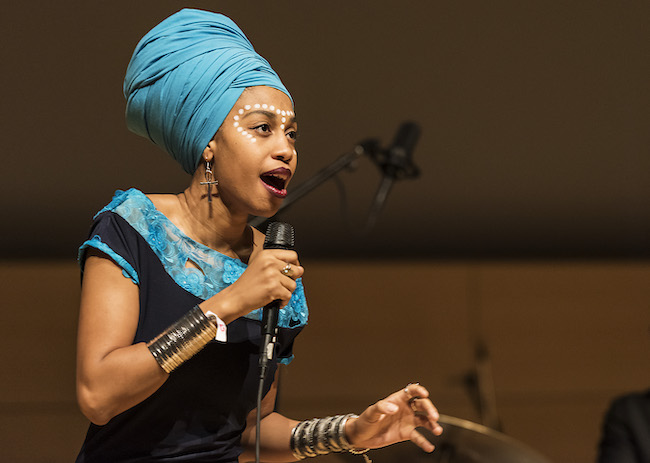Jan 13, 2026 2:09 PM
More Trump-Kennedy Center Cancellations
The fallout from the renaming of the John F. Kennedy Center for the Performing Arts to include President Donald…

Jazzmeia Horn’s begun writing a follow-up to her recently released album Love And Liberation and also started work on a book of poetry.
(Photo: Jack Vartoogian/FrontRowPhotos)On the third night of her June run at Jazz Standard in New York, Jazzmeia Horn leapt into her opener, the Betty Carter signature tune “Do Something,” with a fleet, peripatetic scat. As she progressed further into the improvised number, the references zipped by without pause—Wayne Shorter’s “Footprints,” Ann Ronell’s “Willow Weep For Me.”
Tempting as it is to listen to Horn’s performances for informed quotes like these, such an exercise would miss the point. Horn is a new breed of jazz singer and composer, thoroughly steeped in tradition, yet fully planted in contemporary music and messages. She doesn’t sound like anyone else.
“Think of me as a machine, only in this moment,” she said in a recent interview at the Greenwich Village offices of Concord Records, the label that’s releasing her second album, Love And Liberation. “From the time I was born, all the music I’ve heard has gone into a database. When I’m writing my own songs, I’m using that database. That’s why [my music] sounds maybe like pop, maybe jazz, maybe this, maybe that—because it is. All of my experiences are in my music.”
Horn, 28, began accruing musical experience at a young age, and her naturally big voice set her apart. Raised in Dallas, she started singing in gospel choirs at age 3, and it was in those early church groups that she—and those around her—first realized her gift.
“I was the only toddler singing in the choir with adults, [because] I was too loud for the Pee Wee choir. My family said, ‘We can’t hear anybody else,’” Horn recalled. “So, I sat in with the adults and I fit there. That was the moment [when I noticed], ‘Oh, there’s something different about me. I sing with the adults.’”
As a teenager, Horn auditioned for and was accepted into the prestigious Booker T. Washington High School for the Performing and Visual Arts. (The school’s many notable alumni include trumpeter Roy Hargrove, singer Erykah Badu and vocalist/multi-instrumentalist Norah Jones.) There, one of her teachers suggested that she listen to a variety of jazz singers and learn to improvise.
So, she delved into recordings by the likes of Little Jimmy Scott, Chet Baker, Nat “King” Cole and Ella Fitzgerald. And when she listened to Sarah Vaughan, the young musician became fascinated. “I couldn’t get rid of what her sound did to me,” Horn said. “So, I really started to shed Sarah Vaughan and learn her solos.”
The jazz world soon took notice. As a student, Horn received an Outstanding Performance honor in the Vocal Jazz Soloist category of the DownBeat Student Music Awards in both 2008 and 2009. Then in 2010, as a student at The New School in New York, she won the Vocal Jazz Soloist category for the Undergraduate College division of the SMAs.
Impressive enough—but as honors go, Horn was just getting started. She began to audition “for everything,” she said, just to see what would happen. What happened was a cascade of accolades: the Rising Star award in the 2012 Sarah Vaughan International Jazz Vocal Competition; the first-place spot in the 2013 edition of the Vaughan Competition; a first-place finish in the 2015 Thelonious Monk Institute of Jazz International Vocals Competition; and a win in the category Rising Star–Female Vocalist of the 2018 DownBeat Critics Poll.

Belá Fleck during an interview with Fredrika Whitfield on CNN.
Jan 13, 2026 2:09 PM
The fallout from the renaming of the John F. Kennedy Center for the Performing Arts to include President Donald…

Peplowski first came to prominence in legacy swing bands, including the final iteration of the Benny Goodman Orchestra, before beginning a solo career in the late 1980s.
Feb 3, 2026 12:10 AM
Ken Peplowski, a clarinetist and tenor saxophonist who straddled the worlds of traditional and modern jazz, died Feb. 2…

The success of Oregon’s first album, 1971’s Music Of Another Present Era, allowed Towner to establish a solo career.
Jan 19, 2026 5:02 PM
Ralph Towner, a guitarist and composer who blended multiple genres, including jazz — and throughout them all remained…

Rico’s Anti-Microbial Instrument Swab
Jan 19, 2026 2:48 PM
With this year’s NAMM Show right around the corner, we can look forward to plenty of new and innovative instruments…

Richie Beirach was particularly renowned for his approach to chromatic harmony, which he used to improvise reharmonizations of originals and standards.
Jan 27, 2026 11:19 AM
Richie Beirach, a pianist and composer who channeled a knowledge of modern classical music into his jazz practice,…